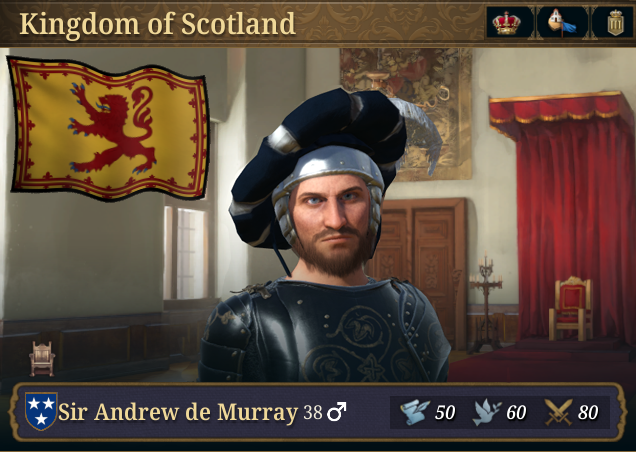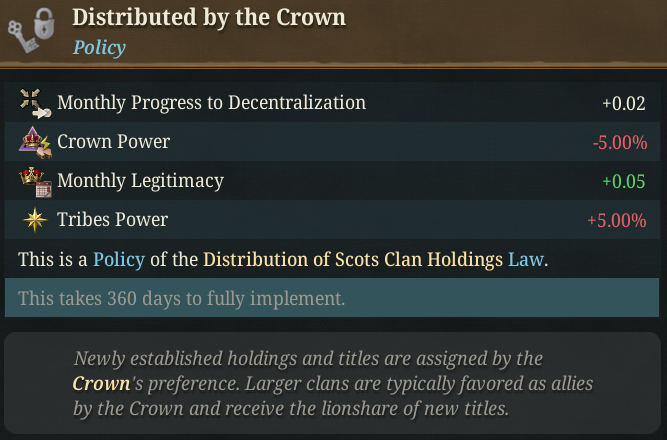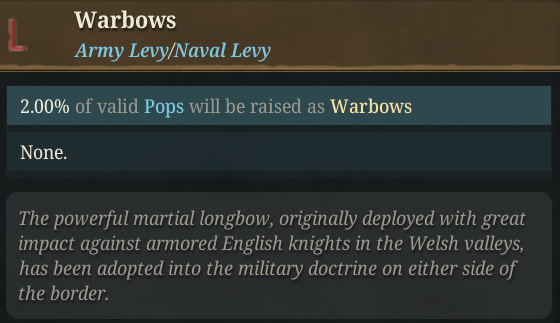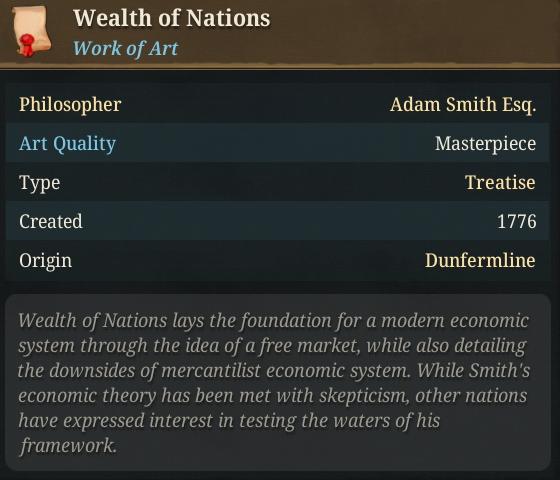Hello, and welcome one more week to Tinto Flavour, the happy Fridays in which we take a look at the flavour content of the super secret Project Caesar!
Today we will be showing the content for the Kingdom of Scotland. Let’s start without further ado:


… The only problem for Scotland is that it starts in a civil war between the followers of King David II de Bruce, who is exiled to France, and those of King Edward de Balliol, nominally backed by England. This makes for a very different and interesting setup, therefore. Also, as always, please remember that any UI, 2D and 3D art is WIP, as usual.
This is the starting situation of the Scottish Civil War:

The starting diplomatic situation of King David II de Bruce:

France is Guaranteeing, while England is an Enemy (has selected Scotland as a Rival).
And that of King Edward de Balliol:

England is Guaranteeing, and the Lordship of the Isles is a vassal.
Let’s start with the content related to the Civil War. Both sides have events available for them, but let’s focus on a couple that you get while starting as Scotland - the supporters of the de Bruce dynasty.
This event will trigger early on:
Maybe you can figure out which aspect gets favoured depending on the tutor you pick for the king…?
And also this one:


You may notice that King David’s name has changed. In the previous event, I selected the second option, the Highlander chieftain, so the culture of the king has changed, and now his name is reflecting that since it has a different variant available.
We’ve made it so the outcome of the Civil War is not an instant end game; if while playing as Scotland you lose it to Balliol, an event will pop up, so you can decide to continue playing with them (or not! That’s up to the player!). This would be the result, thus:

King Edward de Balliol ruling over a once-again unified Scotland.
Let’s now move towards the structural content that you might find while playing with Scotland. This is a unique starting government reform:

Scotland also has some unique privileges for the Lairds (Nobility):

Commissioners (Burghers):

And Clans (Tribesmen) - this is the way we’re representing the Highlanders from a pop-type perspective, which also allows us to have them operating as a different estate:





There’s also this law, with three different policies:




Scotland also has two unique buildings available:


Also something new, Scotland has available some unique parliament issues in later ages, such as:


And a bunch of advances; today we will show mostly late-game ones since it had been requested by you previously to show more of this type of content, and also as a good example of some plausible alt-historical content - you may notice that the advances that Scotland has available for the Age of Revolutions, when they already had ceased to exist as an independent polity (since the Acts of Union of 1707), have a historical background:
This is a specific advance for a Balliol-ruled Scotland:









Related to the latest, there’s a late-game event that may lead you to get this important work of art:

… And much more, but that’s all for today! My fellow colleagues @SaintDaveUK and @Roger Corominas will be replying instead of me today. And for next week, we will travel south, to take a look at the Kingdom of Ethiopia! Cheers!
Today we will be showing the content for the Kingdom of Scotland. Let’s start without further ado:


… The only problem for Scotland is that it starts in a civil war between the followers of King David II de Bruce, who is exiled to France, and those of King Edward de Balliol, nominally backed by England. This makes for a very different and interesting setup, therefore. Also, as always, please remember that any UI, 2D and 3D art is WIP, as usual.
This is the starting situation of the Scottish Civil War:

The starting diplomatic situation of King David II de Bruce:

France is Guaranteeing, while England is an Enemy (has selected Scotland as a Rival).
And that of King Edward de Balliol:

England is Guaranteeing, and the Lordship of the Isles is a vassal.
Let’s start with the content related to the Civil War. Both sides have events available for them, but let’s focus on a couple that you get while starting as Scotland - the supporters of the de Bruce dynasty.
This event will trigger early on:
Maybe you can figure out which aspect gets favoured depending on the tutor you pick for the king…?
And also this one:


You may notice that King David’s name has changed. In the previous event, I selected the second option, the Highlander chieftain, so the culture of the king has changed, and now his name is reflecting that since it has a different variant available.
We’ve made it so the outcome of the Civil War is not an instant end game; if while playing as Scotland you lose it to Balliol, an event will pop up, so you can decide to continue playing with them (or not! That’s up to the player!). This would be the result, thus:

King Edward de Balliol ruling over a once-again unified Scotland.
Let’s now move towards the structural content that you might find while playing with Scotland. This is a unique starting government reform:

Scotland also has some unique privileges for the Lairds (Nobility):

Commissioners (Burghers):

And Clans (Tribesmen) - this is the way we’re representing the Highlanders from a pop-type perspective, which also allows us to have them operating as a different estate:





There’s also this law, with three different policies:




Scotland also has two unique buildings available:


Also something new, Scotland has available some unique parliament issues in later ages, such as:


And a bunch of advances; today we will show mostly late-game ones since it had been requested by you previously to show more of this type of content, and also as a good example of some plausible alt-historical content - you may notice that the advances that Scotland has available for the Age of Revolutions, when they already had ceased to exist as an independent polity (since the Acts of Union of 1707), have a historical background:
This is a specific advance for a Balliol-ruled Scotland:









Related to the latest, there’s a late-game event that may lead you to get this important work of art:

… And much more, but that’s all for today! My fellow colleagues @SaintDaveUK and @Roger Corominas will be replying instead of me today. And for next week, we will travel south, to take a look at the Kingdom of Ethiopia! Cheers!



